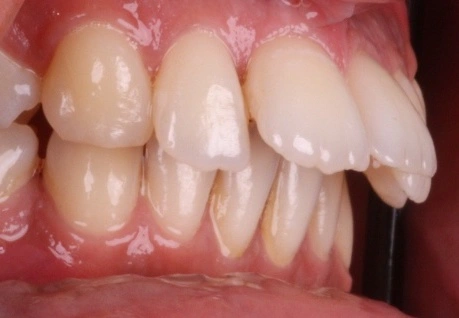Overbite Before and After
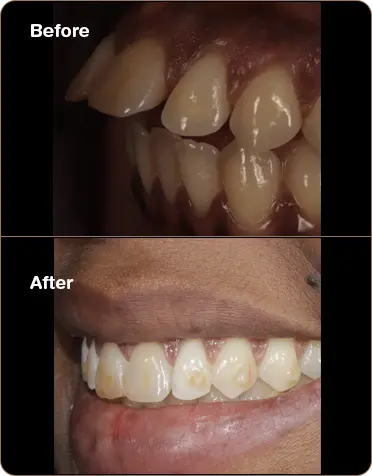
What is an overbite?
An overbite happens when the upper front teeth overlap the lower front teeth too much. Invisalign, a popular treatment, can discreetly and comfortably fix overbites by using clear aligners to gradually move the teeth into their proper positions, giving you a more aligned bite and a confident smile without the need for traditional braces.
What causes an overbite?
It is usually caused by the top and bottom jaws being different sizes. It can also be caused due to missing teeth in the lower jaw which causes the lower jaw to be smaller and a mis-match in jaw size.
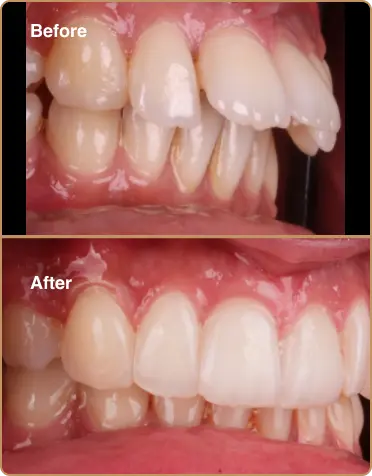
Why Do I Have An Overbite?
- Family Trait - Sometimes, the way our teeth come together is passed down through families. So, if your parents, siblings or grandparents had an overbite, there's a chance you might have one too. It's like how you might inherit the color of your eyes or the shape of your nose.
- Childhood Habits - Things you did as a kid can affect your teeth. If you sucked your thumb or used a dummy for a long time, it might have influenced the way your teeth grew. Just like how playing a musical instrument can shape the way your fingers move, these habits can shape how your teeth come together.
- Jaw Size - Sometimes, due to size and shape of the jaws, they don't fit perfectly together. It could be because your jaw is a bit bigger or smaller than it should be, or maybe your teeth are a little out of line. These differences in size and position can cause your upper and lower teeth to overlap, creating an overbite.
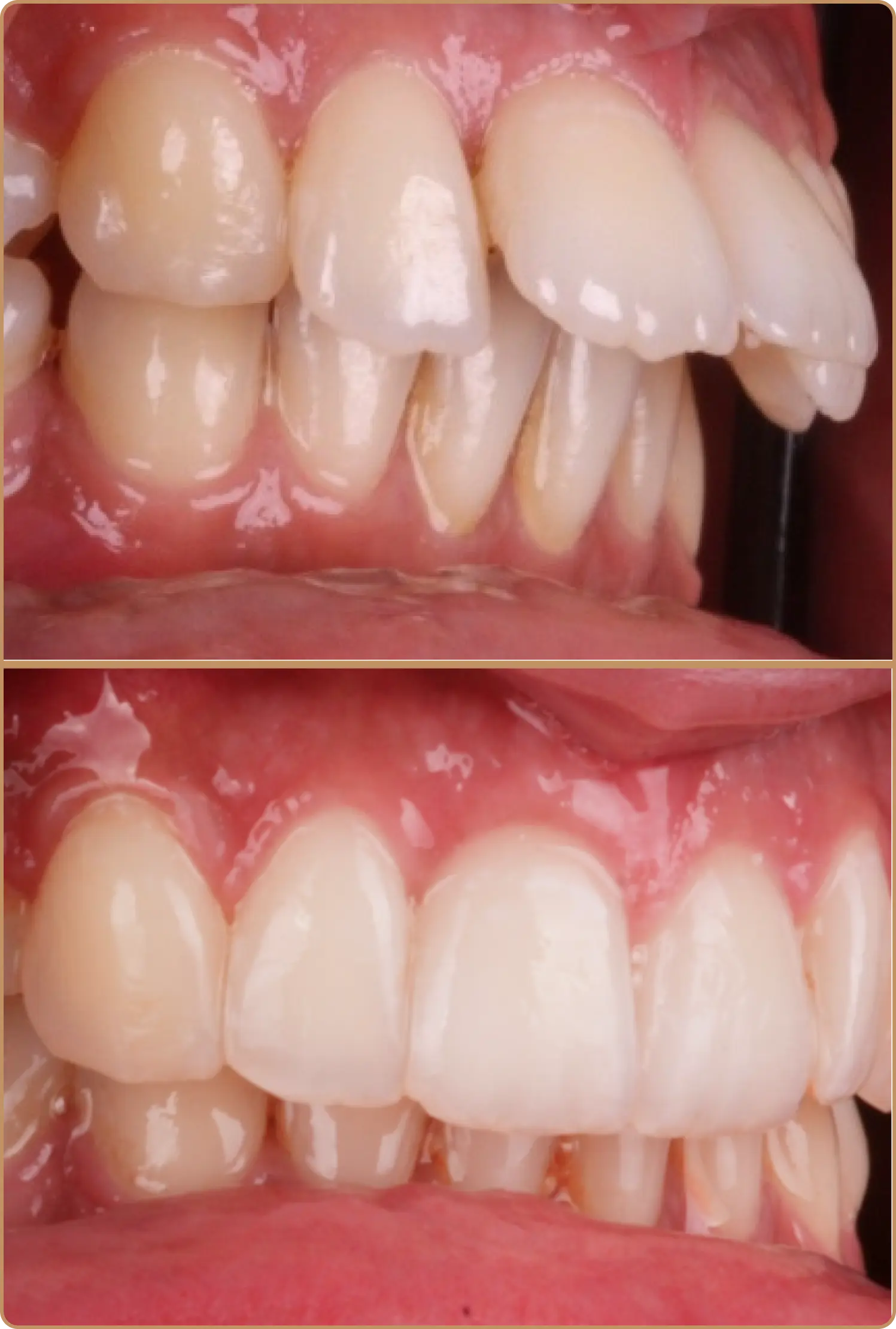
problems with overbites
Whilst you can lead a normal life with an overbite it can cause a number of problems
Aesthetic Concerns
- The overbite that is noticeable can affect self confidence and self esteem, particularly with social interactions.
Functional Problems
- Chewing - An overbite may cause problems with biting and chewing, leading to discomfort and difficulty enjoying certain foods. This can even result in digestive issues.
- Speech - In some cases, overbites can contribute to speech difficulties, affecting pronunciation and clarity.
Oral Health
- Tooth Decay Risk - Overlapping teeth can create tight spaces that are difficult to clean, increasing the risk of plaque buildup and tooth decay.
- Gum Disease Risk - The misalignment of teeth in an overbite may contribute to gum problems, including inflammation and recession. It can even make it difficult to brush your teeth
- Tooth wear / Chipping and breaking - having a large overbite can result in an increased risk of tooth wear, in addition to increased risk of damage to the teeth by breaking them or chipping.
Overbite vs Underbite
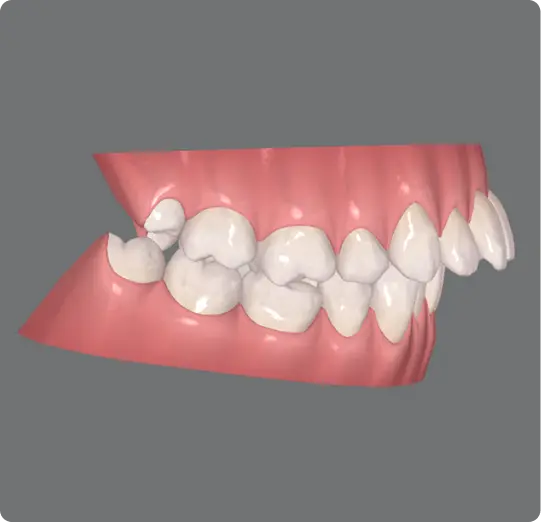
Overbite
- Top jaw usually larger than the lower jaw
- Missing lower teeth can cause an overbite
- Lower jaw is often quite smaller which causes an overbite
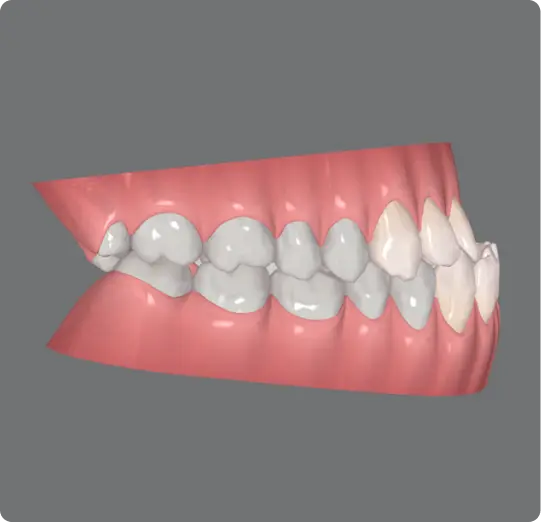
Underbite
- Lower jaw is forwards compared to upper jaw.
- This can happen if there are teeth missing in the upper jaw.
- This is often caused by a larger lower jaw.
Google rating score of 4.8 of 5, based on 350+ reviews
Got my Invisalign and whitening with dr Kunal at the Fleet Street branch and it really has been life changing. He’s given me the confidence to smile and laugh without covering my mouth. Very professional and listens to what i wanted and always exceeded my expectations. Also makes the entire Invisalign journey easy and comfortable as he was always there to answer any questions I had at any time. Highly recommend ruh dental and dr Kunal. It really is the best decision I’ve made. Had so many compliments on my teeth, even by strangers.
I’ve been wanting to come to Ruh dental for years for a perfect smile, my experience has been amazing, the whitening kit really has brightened my teeth I’m always getting compliments from everyone so I’m very glad I chose Ruh.
I couldn’t be happier with my experience at Ruh Dental. The staff are all really friendly and helpful, and every step of the treatment was clearly explained with no sales pressure at any time. My dentist was amazing and I’m so pleased with the outcome.
Overbite or Overjet
The term overbite technically refers to the vertical overlap between the top and bottom teeth. Someone with a deep bite would be considered to have a large overbite. This page refers to the term “overbite” from the view of a patient who is concerned with the horizontal overlap between the top and bottom teeth (“buck teeth” or flared teeth).
The correct orthodontic term here would in fact be overjet, or excessive overjet. We refer to the term overbite as this is what we find most patients actually attend saying they want corrected, which will make this page more informatively valuable for patients with this problem as the term overjet is unlikely to be something they are aware of.
Overbite FAQ
What is an overbite?
An overbite, also known as “buck teeth” or “goofy teeth,” is a dental condition where the upper front teeth overlap the lower front teeth more than normal.
What causes an overbite?
Overbites can result from a number of factors, including genes, thumb-sucking habits in childhood, extended dummy use, and tongue thrusting.
How can I fix an overbite?
Overbites can be corrected through treatments like braces and even Invisalign. In some severe cases, jaw surgery might be required.
What is Invisalign, and how does it work for overbites?
Invisalign is a clear aligner system that gradually shifts your teeth into a planned position. It can correct overbites by applying gentle pressure to reposition your teeth backwards removing the “buck teeth” appearance.
Is Invisalign a suitable option for overbite correction?
Yes, Invisalign is an excellent option for overbites. It offers a discreet and comfortable alternative to traditional braces while achieving significant improvements in a shorter space of time not needing tooth extractions.
How long does it take to correct an overbite with Invisalign?
The treatment duration varies depending on the severity of the overbite. Invisalign treatments typically range from 6 to 18 months.
Are there any age restrictions for Invisalign treatment for overbites?
Invisalign is suitable for both teenagers and adults. It’s never too late to correct an overbite with Invisalign.
What are the benefits of Invisalign for overbites?
Invisalign is nearly invisible, removable, and comfortable to wear. It allows you to maintain good oral hygiene and enjoy your favorite foods without restrictions.
Do I need to wear retainers after Invisalign treatment for overbites?
Yes, retainers are mandatory after Invisalign treatment to maintain the corrected bite and prevent them moving back to the original position.
How can I get started with Invisalign for overbite correction?
To begin your Invisalign journey, book a free a consultation with us. We can take a scan, photos and some records to help visualise the planned outcome before you begin treatment.
How do I know if I have an overbite?
You may notice that you cant fully close your lips, sometimes the top teeth can even sit outside of the bottom lip. The teeth can be chipped or worn, which can also make things worse aesthetically
Will my overbite correct by itself?
Whilst overbites can improve in growing patients, as an adult, overbites are unlikely to improve much at all
How do I fix an overbite?
Addressing an overbite offers various solutions, with Invisalign emerging as a great option. While surgical jaw correction might be necessary in specific cases, it’s not always feasible due to factors like cost and practicality. Fortunately, Invisalign clear braces provide an effective and more accessible alternative for many overbite cases.
Can Invisalign fix an overbite?
Yes and it can work very well, and tooth extractions are not necessary in most cases
Here are a few cases treated with Invisalign to correct overbites.





